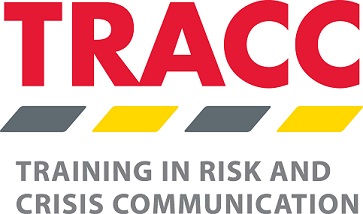 With increasing emphasis on disseminating research directly to the public, START investigators recently completed a contract with the Maryland Emergency Management Agency (MEMA) to provide Training in Risk and Crisis Communication (TRACC) throughout the state of Maryland. TRACC is a social science-based curriculum that covers risk communication during the entire life-cycle of a crisis – preparation, response and recovery.
With increasing emphasis on disseminating research directly to the public, START investigators recently completed a contract with the Maryland Emergency Management Agency (MEMA) to provide Training in Risk and Crisis Communication (TRACC) throughout the state of Maryland. TRACC is a social science-based curriculum that covers risk communication during the entire life-cycle of a crisis – preparation, response and recovery.
The training program was created with funding from the US Department of Homeland Security Science and Technology Resilient Systems Divisions and reflects two years of rigorous research and curriculum development. Specifically, TRACC’s methodology included an extensive literature review, a panel of 26 academic and practitioner experts, a survey completed by 140 risk communicators and an examination of 173 existing risk communication training programs.
The TRACC curriculum stems from what individuals in the field identified as lacking among existing training programs. Some of these gaps included social media, special needs populations and evaluation mechanisms, which are all addressed in TRACC’s curriculum. In addition, TRACC’s value derived from its applicability; not only does it apply to public health, natural disaster and other crises, but it is one of the first such trainings to address terrorism as a potential disaster.
In partnership with MEMA, the trainings were held at county emergency operations centers in Gaithersburg, Reisterstown and Easton. Approximately 40 participants attended the training with a variety of different interests, skill sets and occupations. Participants shared that they enjoyed the opportunity to collaborate with their colleagues and benefited greatly from idea exchanges and lessons learned.
“Effective risk and crisis communication contributes to saving lives during disasters and preventing adverse outcomes,” said Brooke Liu, Director of the Risk Communication and Resilience Program at START. “TRACC is the ideal vehicle to share research-based best practices with those in the field and to learn from their experiences, which inform our future research.”
Training participants mirrored Liu’s enthusiasm.
“The information provided in this training is actually test based, rather than theory. It is scientific and offers us an opportunity to quantify the use of social media. I will urgently request members of [my organization] to take this training,” one anonymous post-training survey participant stated.
To remain as effective as possible, researchers in START’s Risk Communication and Resilience program are continually working to incorporate cutting-edge case studies and research findings into the training. A few current projects include a content analysis of Ferguson social media coverage and an examination of how healthcare systems communicate internally and externally during crises.
START researchers plan to continue offering TRACC trainings to a variety of agencies and welcome additional organizational partnerships such as the one with MEMA. Additional TRACC trainings are currently being scheduled at the University of Maryland this summer and more information can be obtained by contacting tracc@start.umd.edu.
